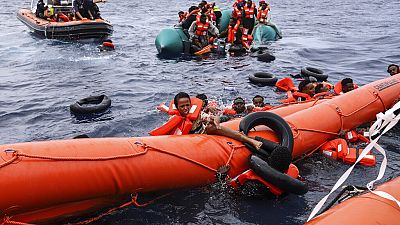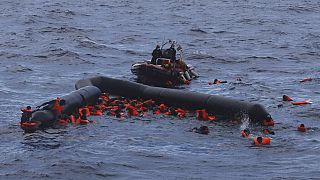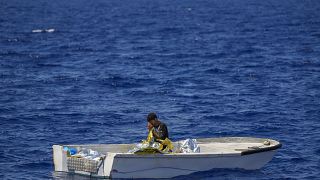Migrants
More than 8,400 Europe-bound migrants perished at sea while attempting to cross the Mediterranean over the past four years, a charity said Tuesday.
Save the Children said in a report that about a half million people crossed or attempted to cross the Mediterranean to Europe since 2019. Of those, 8,468 people died or went missing in the Mediterranean, the charity added.
Analyzing data from the U.N. refugee agency, the charity said deaths at European borders were partly blamed on "the increasing trend of European governments forcibly, illegally and often violently stopping refugees from entering their territory and even abducting and expelling those who have arrived."
The 40-page report cited a 2021 warning by the U.N. refugee agency that "asylum was under attack at Europe's borders" and that pushbacks were being "carried out in a violent and apparently systematic way."
The report mentioned pushbacks of migrants trying to reach Spain from Morocco; Greece from Turkey; and Italy from Libya and Tunisia.
Pushbacks are unlawful under international and European Union law, as they violate the right to seek asylum and the legal principle that prohibits the return of anyone to a place where they would risk persecution, torture or deadly threat.
In its report titled "Safe for Some," the charity accused European countries of having "double standards" in dealing with Middle Eastern and African migrants and those who fled Ukraine over the past year.
Save the Children said over 8 million migrants — 40% of them children — from Ukraine were allowed into Europe since Russia's invasion of the country last February.
"It doesn't need to be this way," said Daniel Gorevan, senior advocacy adviser at the charity and the report's author. "A new European approach — one which puts the rights of all children at the heart of asylum policies — is possible."
Tens of thousands have attempted to cross the Mediterranean to Europe from North African countries that have become hubs for migrants fleeing poverty and wars in Arica and the Middle East, seeking better lives in Europe.
Libya has been a major transit point for migrants since the country descended into chaos following a NATO-backed uprising toppled and killed longtime leader Moammar Gadhafi in 2011.
Human traffickers have benefited from the chaos in Libya, smuggling in migrants across the country's lengthy borders with six nations. The migrants are then packed into ill-equipped rubber boats and other vessels and set off on risky sea voyages.
European countries have in recent years pushed Libyan authorities and the coast guard to detain and intercept migrants attempting to cross European shores.
More than 24,680 were intercepted and returned to Libya, where they were held in detention centres rife with abuses, according to the U.N. migration agency. Such abuses include forced labour, beatings, rapes and torture — practices that amount to crimes against humanity, according to U.N.-commissioned investigators.













01:40
Kenya cancels airport and energy deals with Adani group after the U.S. indicts the tycoon
Go to video
Fugitive Zambian MP Emmanuel Jay Banda arrested in Zimbabwe after three-month Manhunt
Go to video
Spain to offer residency and work permits to undocumented migrants
Go to video
Archbishop of Canterbury will end official duties in early January amid sex abuse scandal
Go to video
Congo opposition leaders call for protests against president's plan to change constitution
01:10
Spain’s left-wing government stands out on migration policy in the EU